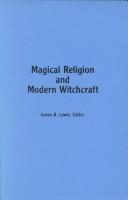| Listing 1 - 7 of 7 |
Sort by
|

ISBN: 0791428907 Year: 1996 Publisher: Albany (N.Y.) : State university of New York press,
Abstract | Keywords | Export | Availability | Bookmark
 Loading...
Loading...Choose an application
- Reference Manager
- EndNote
- RefWorks (Direct export to RefWorks)
Goddess religion --- Magic --- Neopaganism --- Witchcraft --- History --- 20th century --- Paganism --- Magic - History - 20th century. --- Witchcraft - History - 20th century. --- Paganism - History - 20th century. --- Goddess religion - History - 20th century.
Book
ISBN: 9780521194167 0521194164 9780511730115 9780511725944 0511725949 051173011X 1107204631 0511846827 1282619810 9786612619816 0511729243 0511728298 0511724535 0511727348 1108984967 Year: 2010 Publisher: Cambridge Cambridge University Press
Abstract | Keywords | Export | Availability | Bookmark
 Loading...
Loading...Choose an application
- Reference Manager
- EndNote
- RefWorks (Direct export to RefWorks)
Graeco-Roman religion in its classic form was polytheistic; on the other hand, monotheistic ideas enjoyed wide currency in ancient philosophy. This contradiction provides a challenge for our understanding of ancient pagan religion. Certain forms of cult activity, including acclamations of 'one god' and the worship of Theos Hypsistos, the highest god, have sometimes been interpreted as evidence for pagan monotheism. This book discusses pagan monotheism in its philosophical and intellectual context, traces the evolution of new religious ideas in the time of the Roman empire, and evaluates the usefulness of the term 'monotheism' as a way of understanding these developments in later antiquity outside the context of Judaism and Christianity. In doing so, it establishes a new framework for understanding the relationship between polytheistic and monotheistic religious cultures between the first and fourth centuries AD.
Religious studies --- Monotheism --- Paganism --- Monothéisme --- Paganisme --- History --- Histoire --- Rome --- Religion --- History. --- Religion. --- 211.34 --- Religion Concepts of god Monotheism --- Monothéisme --- Civilization, Pagan --- Heathenism --- Religions --- God --- Pantheism --- Polytheism --- Theism --- Trinity --- Arts and Humanities --- Monotheism - History - Congresses --- Paganism - History - Congresses --- Monothéisme - Histoire --- Paganisme - Histoire --- Rome - Religion - Congresses --- Rome - Religion --- Religion romaine
Book
ISBN: 9782251381121 2251381120 Year: 2012 Volume: 112 Publisher: Paris : Les belles Lettres,
Abstract | Keywords | Export | Availability | Bookmark
 Loading...
Loading...Choose an application
- Reference Manager
- EndNote
- RefWorks (Direct export to RefWorks)
Un certain nombre d'intellectuels païens de l'Antiquité tardive (IVe et Ve siècles) avaient entrepris une guerre à mots couverts contre la pensée chrétienne en train de s’installer. Cet ouvrage redessine les contours des relations polémiques entre les païens et les chrétiens sous le règne de Théodose (379-395). Au cœur de ce jeu antagoniste se place la figure complexe et polymorphe de Nicomaque Flavien senior. Les chrétiens en avaient fait l’un de leurs adversaires privilégiés. Placé par ses fonctions officielles auprès de Théodose au centre du système judiciaire, il fut un juriste avisé, rédacteur de lois pour le Prince mais aussi habile propagandiste, dans l’Histoire Auguste, de thèmes idéologiquement très proches des positions de l’aristocratie païenne, par exemple en matière de morale sexuelle ou de gestion des patrimoines. L’analyse de documents méconnus permet également de penser que l’homme fut un adepte du néoplatonisme, ce qui n’avait jamais été établi jusque-là. La crainte de la répression policière l’a conduit à crypter son message politique et religieux en recourant de manière systématique aux ressources inépuisables de l’art de la fiction. L’auteur propose au fond une analyse originale de ce qu’il appelle « le malaise païen », fondée sur le constat que les païens comme les chrétiens privilégiaient dans l’expression et la défense de leurs convictions religieuses des formes littéraires élaborées. Fiction et religion constituent ainsi deux thématiques communes à tous les intellectuels de l’époque et elles ne sauraient être dissociées dans l’approche d’une période aussi riche.
Christianity and other religions --- Paganism --- Church history --- Christianisme --- Paganisme --- Eglise --- Relations --- Christianity --- Histoire --- History --- Christianity and other religions - Paganism. --- Christianity and other religions - Paganism - History - Early church, ca 30-600 --- Paganism - Relations - Christianity --- Church history - Primitive and early church, ca. 30-600 --- Paganisme et christianisme

ISSN: 16242696 ISBN: 2853995054 2853994589 9782853994583 9782853995054 Year: 2002 Volume: 1 Publisher: Aix-en-Provence : Publications de l'université de Provence,
Abstract | Keywords | Export | Availability | Bookmark
 Loading...
Loading...Choose an application
- Reference Manager
- EndNote
- RefWorks (Direct export to RefWorks)
Atheism
---
Paganism
---
Church history
---
Eastern churches
---
Athéisme
---
Paganisme
---
Eglise
---
Eglises orientales
---
History
---
Congresses
---
Histoire
---
Congrès
---
Bible
---
Criticism, interpretation, etc.
---
Critique, interprétation, etc.
---
Athéisme
---
Congrès
---
Critique, interprétation, etc.
---
Cultes
---
Prayer
---
#BIBC:ruil
Book
ISBN: 9789042921306 9782758400462 2758400464 9042921307 Year: 2009 Volume: 47 Publisher: Paris : Peeters,
Abstract | Keywords | Export | Availability | Bookmark
 Loading...
Loading...Choose an application
- Reference Manager
- EndNote
- RefWorks (Direct export to RefWorks)
Polytheism --- Monotheism --- Paganism --- Judaism --- Church history --- Polythéisme --- Monothéisme --- Paganisme --- Judaïsme --- Eglise --- History --- Histoire --- Rome --- Greece --- Grèce --- Religion --- Religious communities --- Group identity --- Religious aspects --- Church history. --- 27 "00/05" --- Christianity --- Ecclesiastical history --- History, Church --- History, Ecclesiastical --- Civilization, Pagan --- Heathenism --- Religions --- Collective identity --- Community identity --- Cultural identity --- Social identity --- Identity (Psychology) --- Social psychology --- Collective memory --- Communities --- Religious institutions --- History. --- Religious aspects. --- Kerkgeschiedenis--?"00/05" --- Antike --- Communautés religieuses --- Monde grec --- Monde romain --- Religiöse Identität --- Religiöse Identität --- Identification (religion). --- Antike. --- Religiöse Identität. --- Religiöse Identität. --- Polythéisme --- Monothéisme --- Judaïsme --- Grèce --- Religious communities - Greece - History --- Religious communities - Rome - History --- Group identity - Greece - Religious aspects --- Group identity - Rome - Religious aspects --- Paganism - History --- Judaism - History
Book
ISBN: 9789042922426 9042922427 Year: 2010 Volume: 12 Publisher: Leuven ; Walpole, MA : Peeters,
Abstract | Keywords | Export | Availability | Bookmark
 Loading...
Loading...Choose an application
- Reference Manager
- EndNote
- RefWorks (Direct export to RefWorks)
The fourth century was a major religious battleground. The rise of Christianity, and in particular its dominance from Constantine onwards, marked an important shift in the religious history of the Mediterranean. Christianity saw this change as the victory of its monotheism over the polytheism of paganism. This volume studies how similarities between paganism and Christianity were obscured in the polemic that was waged by Christianity against paganism and in the pagan responses to it. The volume includes papers on Porphyry, Augustine, Themistius, Latin verse inscriptions, as well as dealing with the different ways in which Christian and pagan thinkers conceived of monotheism. A recurring theme in the papers shows that a concrete religions issue lay at the heart of such polemic: who can worship?
Monotheism --- Paganism --- Christianity and other religions --- Theology --- Monothéisme --- Paganisme --- Christianisme --- Théologie --- History. --- Relations --- Christianity. --- History --- Histoire --- Christianity --- 141.412 --- 27 "00/09" --- Monotheïsme --- Kerkgeschiedenis--eerste millennium AD. Eerste millennium na J.C.--(variabel) --- Paganism. --- 141.412 Monotheïsme --- Monothéisme --- Théologie --- Civilization, Pagan --- Heathenism --- Religions --- Syncretism (Christianity) --- Relations&delete& --- Monotheism - History --- Paganism - Relations - Christianity --- Christianity and other religions - Paganism --- Theology - History - Early church, ca. 30-600 --- Paganism - History --- Monothéisme - Histoire --- Paganisme - Relations - Christianisme --- Christianisme - Relations - Paganisme --- Théologie - Histoire - ca 30-600 (Église primitive) --- Paganisme - Histoire
Book
ISBN: 9780199747276 019974727X 019986621X 0199959706 9786612978555 1282978551 0199780919 9780199959709 Year: 2011 Publisher: Oxford Oxford University Press
Abstract | Keywords | Export | Availability | Bookmark
 Loading...
Loading...Choose an application
- Reference Manager
- EndNote
- RefWorks (Direct export to RefWorks)
Roman history --- Christian church history --- anno 1-499 --- Christianity and other religions --- Church history --- Paganism --- Emperors --- Christianisme --- Eglise --- Paganisme --- Empereurs --- Roman. --- Relations --- Christianity. --- Religion romaine --- Histoire --- Rome --- History --- Roman --- Christianity --- Civilization, Pagan --- Heathenism --- Religions --- Caesars --- Decennalia --- Roman emperors --- Apostolic Church --- Church, Apostolic --- Early Christianity --- Early church --- Primitive and early church --- Primitive Christianity --- Fathers of the church --- Great Apostasy (Mormon doctrine) --- Syncretism (Christianity) --- Relations&delete& --- Christianity and other religions - Roman --- Church history - Primitive and early church, ca. 30-600 --- Christianity and other religions - Paganism - History - Early church, ca. 30-600 --- Paganism - Relations - Christianity --- Emperors - Rome --- Christianisme - Relations - Religion romaine --- Eglise - Histoire - ca 30-600 (Eglise primitive) --- Paganisme - Relations - Christianisme --- Empereurs - Rome --- Roma --- Religion --- Rome - History - Empire, 30 B.C.-476 A.D. --- Rome - Histoire - 30 av. J.-C.-476 (Empire) --- 30-600-(Église-primitive) --- 30 av. J.-C.-476 (Empire) --- 30-600-(Église-primitive)
| Listing 1 - 7 of 7 |
Sort by
|

 Search
Search Feedback
Feedback About UniCat
About UniCat  Help
Help News
News